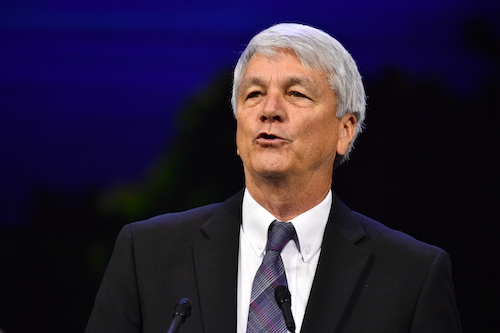On Tuesday morning, National Electrical Contractors Association Chief Executive Officer David Long and President Kirk Davis addressed the convention, each emphasizing the critical need to find enough skilled, unionized workers to meet the ever-increasing demands of a modern electrical revolution.
 |
| NECA President Kirk Davis reminds convention delegates that joint apprenticeship training centers are one of the best paths for men and women to get into the electrical industry. |
“The stronger we make our contractors, that we make our IBEW union, the more we can grow, the more work that we can accommodate in our industry,” said Davis, the retired president of Bob Davis Electric, who spoke first.
NECA was founded in 1901 to help electrical contractors across the United States grow their businesses safely and professionally. Today in the United States, there are an estimated 70,000 contracting firms, most of which are proudly IBEW and NECA signatories.
“The electrical revolution is here,” said Long, who started out as a construction wireman for Miller Electric in Jacksonville, Fla., in 1975 and who remains a dues-paying member of Jacksonville Local 177. “It will require all of us — management and labor — to grow like never before, and we cannot develop fast enough.”
Davis has a history with the IBEW, too. After he graduated from Louisiana State University, he wanted to work for the company his grandfather had founded in 1922. “But before I did that, the first thing I did was join the electrical apprenticeship,” he said, becoming a member of Shreveport, La., Local 194.
Joint apprenticeship training centers are “one of the best paths people have to get into the industry,” Davis said. “This is one of the best things that I think that our two groups do together, to provide the education and the training to apprentices.”
Davis worked the tools for almost six years after he turned out. “We always were proud of the quality of work we had, that our members from the IBEW were able to produce,” he said. “It allowed us to get more and more customers.
“For years, we’ve been able to have a fairly good market share, making sure it’s union work, by the way we were able to work together and carry on conversations,” Davis said. “I know we didn’t always agree 100% on everything, but I think the leadership that we had in our local union working with the contractors, we always had the best interest of our industry at heart.”
Today, that industry is in desperate need of workers, Davis said. “We need to share what it means to be an electrician and the quality of life that we can have,” he said.
Taking the podium next, Long acknowledged just how rapidly the electrical industry is growing and expanding. “We have an opportunity like never before,” he said.
The list of needs seems endless, he said: from preventing climate change to becoming energy independent to rebuilding aging infrastructure. As a result, Long reiterated, staffing remains a key concern.
“As I go around the country, union leaders say to me, ‘Dave, if your contractors would bid more work, we’d get more people,’” he said. “Our contractors say, ‘If I had more people, I’d bid more work.’
“What’s the common denominator? It’s people,” he said. “If anything keeps us up at night as leaders, it’s about where we go to get the people. For the first time in 60 years, the traveling worker cannot bail us out of this problem.
“People that have not been allowed to work in this industry because we would not open our doors to diversity, equity and inclusion, they deserve what we’ve got,” Long said. “That is our destiny.
“We are not standing on the shoulders of giants. We’re borrowing this industry — the unionized sector of the electrical industry — from future generations,” Long said. “Do [Lonnie] and I have all the answers? No, but there’s enough brain trust in this industry to figure this out, and we must do that.
“Your leaders and our leadership team, we’re damn determined to change the course of history,” Long said.